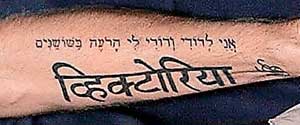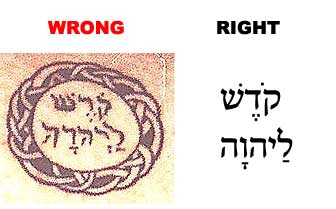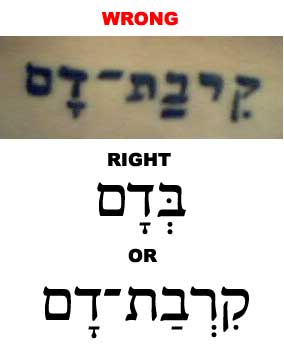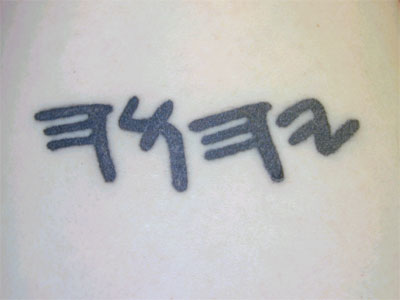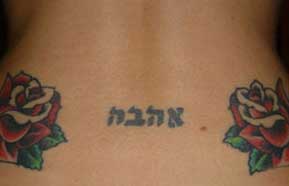Believe it or not, one of the more frequent Google searches by which individuals happen upon my blog is a search for “Hebrew Tattoos.” This search, which appears to happen once every few hundred visits to my site, leads readers to my tongue-in-cheek post “Posh Hebrew Tattoos, David! (Beckhams Inscribe their Love).” I have also had individuals email me asking advice on Hebrew tattoos, primarily wanting verification about the spelling of this or that word. My own students also ask similar questions (the latest being just last week).
This interest in Hebrew tattoos intrigues me. It obviously piggy-backs on the popularity of tattoos in general, though I suspect that the fact you have high profile celebrities like David and Victoria Beckham, Madonna, and Britney Spears with Hebrew tattoos boosts their popularity. And, of course, you have the religious crowd that likes tattoos of a biblical character, whether Hebrew, Greek, or even Aramaic.
At any rate, after reproducing the Google search for “Hebrew Tattoos” you will come across a number of web sites that specialize in tattoos, even ones devoted to Hebrew Tattoos that want to cash in on the craze. Most of these sites have sample pictures of actual Hebrew tattoos. What I found troubling is the number of mistakes in these tattoos. As a public service to any individuals thinking of getting a Hebrew tattoo, I thought I would highlight some of the mistakes so that others may avoid them in the future.
Hebrew Tattoos You Don’t Want

This first example of the Hebrew term for “God” makes a simple mistake of confusing Hebrew characters that look similar (of which there are a few!). The bottom letter on the tattoo is a samech (a Hebrew “s”) while it is supposed to be a mem (a Hebrew “m”). Another possibility that Yitzhak Sapir noted in the comments, is that the final letter is the Rashi script for final mem. He suggests that “some Jewish figure who was uncomfortable writing out the name of God changed scripts as a result.” While this is certainly possible, it seems odd that the rest of the tattoo is standard Aramaic square script. I am also not sure how many Jewish tattoo artists are out there who know Rashi’s script! I think my explanation makes a bit more sense. This tattoo is an example of a simple mistake made by someone who was trying to match the letters from a picture or something (I get quite a few papers from students who know a little Hebrew and try to include Hebrew words but they confuse stuff like final mem and samech, resh and dalet, etc.). Either way, if you are going to get a tattoo, it’s probably better to use the same script for the entire thing!
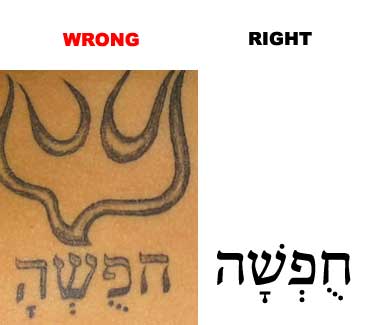
This tattoo, which has a Hebrew word purported by the website I found it on to mean “freedom” (perhaps based on Lev 19:20?) has the vowel points shifted incorrectly to the left. As such it is nonsensical. Moreover, as the comments to this post indicate, in modern Hebrew this word (if correctly pointed) means “vacation” — which I am pretty sure the individual who got the tattoo did not want (especially considering the symbol of the Holy Spirit above it!).
This tattoo, which means “holy to the LORD/Yahweh,” has letters which are either not drawn very carefully or confused (note the difference in width in the second last character in the bottom word; the tattoo has what looks like a dalet or resh, which it should be a vav) as well as incorrect vowel pointing.
This tattoo is supposed to say “in blood” according to the website where I found it. The expression is not biblical Hebrew, but a modern Hebrew phrase for “blood relative” or the like (see the comments by Yitzhak Sapir). Of course, the tattoo is still incorrect since it is missing the silent sheva after the resh (and the resh looks a bit like a yod). (If I was going to write “in blood” in Biblical Hebrew, I would simply do it as I have it on the bottom.)
This tattoo of the name of the God of Israel, “Yahweh,” is fine, though the web page identified it as Aramaic. In fact, this is a paleo-Hebrew script of the divine name.
There is nothing wrong with this Hebrew tattoo. I just thought it’s funny because the word inscribed can possibly mean both “love” as well as “leather” (some scholars suggest that there is a homograph [×?הבה II] which means “leather” [see KB3]). It arguably occurs in Hosea 11:4 [perhaps] and Song 3:10 [more likely]). Perhaps this can be taken as a warning not to spend too much time in the tanning salons?! (Of course, in modern Hebrew ×?הבה clearly means love, and as I already noted, there is nothing wrong with this tattoo.)
The lesson here is that you cannot trust pictures of Hebrew tattoos on the internet! Make sure to double check the spelling of the Hebrew word you want tattooed!
Tips for Getting Hebrew Tattoos
If you are thinking of getting a Hebrew tattoo, consider the following:
First, think long and hard about getting a tattoo because they are permanent (notwithstanding modifying tattoos or erasing them). If you are set on the idea of getting a tattoo, think about getting a temporary one first. Also think about where you put your tattoo. Based on the experience of friends, I wouldn’t suggest getting a tattoo on any place where your body may change drastically as you age (and women, beware of tattoos on your stomach as if you ever get pregnant, your tattoo may be stretched beyond recognition (and it may not go back to its original shape — ask my friend!).
Second, if you are getting a Hebrew tattoo, make sure to double check with someone who knows Hebrew (or Greek if you are getting a Greek one) whether or not you have the proper spelling of the word. It would be a bummer to get a tattoo like those above — the only consolation would be that most people wouldn’t know you have a spelling mistake permanently inscribed on your body!
Third, one thing to decide before getting a Hebrew tattoo is whether or not to just use consonants (as Hebrew was originally written) or use consonants with the Masoretic vowel pointing (the little dots and dashes above and below the consonants). The vowel points were added to the text of the Hebrew Bible in the early centuries of this era by Jewish scribes called the Masoretes. While the vowel points represent an ancient reading tradition, they are not original to the Hebrew text, so you may not want to include them. (I personally wouldn’t include them if only for aesthetic reasons)
Finally, make sure to go to a reputable tattoo shop!
As a side note, I don’t have any tattoos nor any intention of getting one — and I hope that this trend will die down by the time my kids are older! My primary problem with tattoos is that they are too permanent; what you may think is cool when you are younger, you may later regret.

